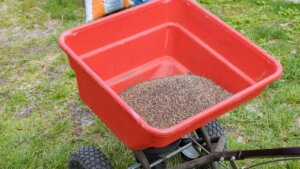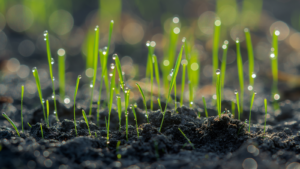You want your lawn and garden to look their best, which means that you are likely going to use fertilizer of some kind. One choice you need to make is whether or not to use synthetic fertilizer. Synthetic fertilizers are effective and popular with many homeowners and gardeners who want beautiful blooms and healthy green grass. Here, we will explain what exactly synthetic fertilizers are and how you can use them for optimal growth.
What Is Synthetic Fertilizer?
Synthetic fertilizers are man-made chemical compounds that are added to soil to improve plant growth and increase crop yields. These fertilizers are made up of a combination of essential nutrients such as nitrogen (N), phosphorus (P), and potassium (K).
How Does Synthetic Fertilizer Work?
Both organic and synthetic fertilizers work by providing key nutrients to plants as they grow. The three main nutrients are described as the NPK level, and the numbers on the fertilizer label describe the ratio of these three nutrients. For synthetic fertilizers, the NPK values are controlled by the manufacturer and are usually higher than their organic counterparts.
Synthetic fertilizers are made using custom chemical blends in laboratories. Unlike organic fertilizer, which is made from organic matter like compost and manure, synthetic fertilizers are made according to specific formulas. This means that the labs can create plant-specific blends or blends that help meet the challenges of various growing conditions.
When To Use Synthetic Fertilizer
The choice between organic and synthetic fertilizers often comes down to your goals for the plant’s growth. The two are quite different in their nutrient delivery, simply due to the strength and chemical ratios found in each type of fertilizer.
Key Differences Between Synthetic and Organic Fertilizers
| Synthetic Fertilizer | Organic Fertilizer |
| Feeds the plant for immediate nutrient release | Feeds the soil for long-term nutrient release |
| Few micronutrients for a more tailored approach | Wide range of micronutrients |
| Water releases nutrients | Soil microbes release nutrients |
| Steady, controlled nutrient levels | Nutrient levels fluctuate |
| Higher NPK level | Lower NPK level |
When you want to see quick plant growth or need a very specific nutrient combination to properly feed one particular plant, synthetic fertilizers provide faster, more optimal nutrition.
Using Synthetic Fertilizers Effectively
Because of their strength, synthetic fertilizers are tricky to use correctly. Use too much, and you can cause nutrient burn, which damages the plant.
Synthetic Fertilizer Advantages and Disadvantages
| Advantages | Disadvantages |
| Easy to store and transport | Can cause overnutrition/nutrient burn |
| Fast growth | Fast top growth may stress roots |
| Inexpensive | Many applications needed |
| Easy to apply | Not environmentally friendly |
| Higher amount of nutrients | Up to ⅓ of the nutrients are lost in water |
| Larger blooms and top growth | Contributes to soil degradation and loss of soil microbes |
In order to use synthetic fertilizers safely and effectively, it’s important to choose the correct fertilizer for your situation. You also need to keep your applications precise and limited. Synthetic fertilizers must be applied in the correct area of your lawn to ensure proper nutrient delivery.
It is important to find ways to use synthetic fertilizer safely and responsibly if you want to use it for your garden or lawn. At Terra Lawn Care Specialists, we are lawn fertilizer experts. Give us a call at 610-275-2170 to discuss your lawn fertilizer options and get a free quote today! You can also contact us via our webpage for more information.



